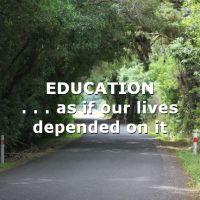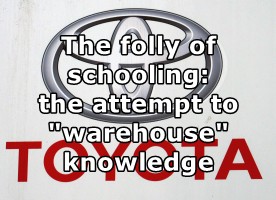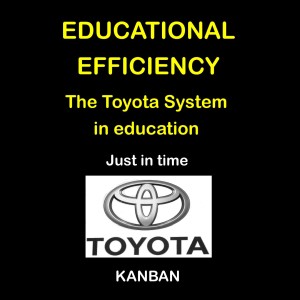Chapter 9:
The “Toyota System” in education
|
 One automatic and weary objection to the very idea of changing our practice will be a combination of time and money. The justification for building this vast factory system in the first place, and being stuck with it, is supposedly cost-effectiveness. Schooling is one of the largest of State budget items, but even so, we built these schooling factories because processing learners through factories en mass is apparently cheaper than any other alternative. If we genuinely catered for each learner in their individual motivation, the costs would soar out of control – or so it is thought.
One automatic and weary objection to the very idea of changing our practice will be a combination of time and money. The justification for building this vast factory system in the first place, and being stuck with it, is supposedly cost-effectiveness. Schooling is one of the largest of State budget items, but even so, we built these schooling factories because processing learners through factories en mass is apparently cheaper than any other alternative. If we genuinely catered for each learner in their individual motivation, the costs would soar out of control – or so it is thought.
We have to do it this way because there is just so much to teach in order for a person to function in our complex, contemporary world. There just is not time to dally over properly connecting everything into the details of our learners’ lives, or equipping them to make their own educational judgments, or genuinely enabling them to think and judge independently, particularly about living well. This is the justification we use for doing something that is at odds with human nature, dignity, respect and freedom – all of which inevitably lead to educational inefficiency; though that is all right, because it is cost effective.
There is a third reason which is, I think, the real reason, and that is that we are afraid of creating confident people who can think well for themselves, about themselves and the world that they inhabit. We are afraid of what they might do, in their independence, because they might reach the “wrong” conclusions. This is a deep political concern. It is invariably a fear about what the “others” will do – but mostly not about ourselves or our own children, because we think of ourselves as reasonable people.
Most parents would probably want their children to think critically about their lives, and to be in charge of them, but they can’t really imagine it in a way that is very different from the way they are themselves, and they, of course, went through much the same system and learned to accept it – including its inevitability. It didn’t do them any harm, or so it appears. Schooling, to the vast majority, is just the way things are, and there are no thinkable alternatives. So they are more likely to worry about any hiccups in their children’s progress through school than to be anxious about the systematic harm that it is doing to them.
This chapter isn’t about this deep fear of education that has been unreasonably induced in us, however. Instead, I am going to look at the time and money issue, because the schooling factory system involves massive over-teaching and redundancy. Getting the motivation right and enabling learners to acquire educational judgment would also generate efficiencies and save time, but here we are going to focus on the educational inefficiency that results from the problem of redundancy.
Reflecting on courses that you have taken in the past, I am sure that you are glad that the assessments were conducted during the course, or at the end, and not three or six months after they were finished. I am sure that most of us are aware how little is left after three or six months, and consider that a little ruefully.
When you consider what you can actually remember from all those classes at high school, and what you still can do as a result of them, I wonder how long it would take to teach that to someone else. A year for the lot? I don’t really know. When educational psychology was in its infancy – about a hundred years ago – they used to study these things – how fast it all fades. We don’t attend to it any more. When, in the whole process of your schooling, did you ever actually have a test three months later – six months, or a year. What would you do about the bad news anyway? Do the course again? It literally doesn’t bare thinking about.
The very idea that we might build education around the real and current agendas of learners raises a perennial question that John Holt responded to many, many years ago. “Suppose they don’t learn something they will need later?” and his answer was: “ The time to learn something is when you need it; no one can know what he will need to learn in the future; much of the knowledge we will need twenty years from now may not even exist today”. (1) And he might have added – much of what we consider to be knowledge today won’t be considered knowledge in twenty year’s time.
But regardless of how our needs for knowledge may change in the future, a stronger reason for saying that you should learn something when you need to learn it is that learning is, for the most part, a “use it or lose it” proposition. Unless you have continued to use the material throughout that period, or your learning involved some sort of memorable surprise, it will have faded away significantly.
I mention surprise, because one way to look at educational processes is developmentally. There are two distinct types of objectives that we might usefully have in mind when we attempt to bring about learning. One is to help people learn things they need right now – to help them with an undertaking they are engaged in, and as they need it. Don’t teach stuff except for a very immanent need, because otherwise it will almost surely fade.
The second thing is to create experiences that will reverberate for years – things that are calculated to have a positive effect on the learner’s future development over a considerable span. That is why I mentioned surprise. Intellectual surprises are often things that are remembered because of the way they disrupted stable and settled patterns of thinking and acting, with consequences that may take a long time to work through – and indeed may change the ways in which we work through things ever again. I will always remember the moment when . . .
This second sort of developmental learning has less to do with teaching learners the current state of our knowledge or skill than it does with challenging them and opening up options, causing them to be confused about their established positions, or how to make sense of things. Not just random confusion but confusion that arises from an awareness that their cherished beliefs or ways of thinking aren’t really working and they need something better. Confusion that causes them to work through or hang on for a better understanding. This might take weeks or months, or years, or all three in a recurring evolution. It is not what they know when they walk out the door at the end of a course that matters, it is how certain experiences in the course will continue to affect them – sometimes months or years later.
This sort of process makes nonsense of conventional assessment of courses, because it isn’t a test at the time that matters, and it is very difficult to really know what to test, because the process isn’t identical for different learners. The challenge and the opportunities may affect different learners in different ways and still represent growth or advancement for them all. There may be no simple recipe, or right answer, or appropriate performance. Feedback can be subtle, behavioural, and personal, and each improvement may be unique. The whole process is more true to life, as life develops, rather than something that should be industrialized. It is not some mystery, though, requiring an inspiring teacher – just an educated one.
Most of our schooling is not of this sort, however. These processes aren’t captured by conventional assessment, which places a heavy emphasis on standardisation – made worse these days by heavy burdens of reporting and auditing. Little of the learning in schooling is developmental in the sense that I have just explained it. Most of it is being learned in case learners will need it later. Most is therefore lost in a “use it or lose it” process.
The error and the absurdity of the wastage here can illustrated by analogy to the  “Toyota system”. Toyota conceived of two approaches to manufacturing cars – the conventional system employed in most manufacture, which was labelled “just-in-case”; and the system that they pioneered, called “just-in-time”. The conventional “just-in-case” system involved a huge and expensive local warehousing of parts that would be required in car construction, which were fed to the production-line as they were needed.
“Toyota system”. Toyota conceived of two approaches to manufacturing cars – the conventional system employed in most manufacture, which was labelled “just-in-case”; and the system that they pioneered, called “just-in-time”. The conventional “just-in-case” system involved a huge and expensive local warehousing of parts that would be required in car construction, which were fed to the production-line as they were needed.
The “just-in-time” system, however, required better planned and coordinated arrangements with suppliers so that the supplies needed by the line entered the gates directly from these contractors, reaching the line “just-in-time”. This far more efficient system resulted in significant savings in money, time, plant and staff.
Conventional schooling (a factory system) is a “just-in-case” system. Knowledge is to be stored in the learner because it might be needed some day – perhaps when they grow up and leave school. This is true, even of vocational education, which is organized according to “what the job requires” (on some detached analysis which includes all the things that might be needed – on some current assessment), and not learned “when the job requires it”.
Many years ago, in a time of heightened awareness of how computerization was going to change our world, great things were predicted for careers in computing, and computing schools and departments were flooded with eager trainees. A degree takes some years, of course, and when the dotcom boom was followed by an equal bust, it was common to meet people with degrees in computing who found themselves in careers for which they may as well have had no credentials at all. When the next computing boom came, their original training was far too outdated to be of any use. This is a common-place in vocational education. Assessments are made of workplace needs, with very unreliable predictions. By the time a cohort has worked its way through the training, the workplace needs have changed again.
The “just-in-case” system would still be a clumsy and inefficient system even if the items stored in the learners did not decay. The traditional “just in case” model wasn’t used “just in case” we might one day want to build a truck, or a tank, or a shopping basket for little old ladies. It was a system of “just in case it turns out that we don’t have enough parts for the vehicles that are actually in production”. In education though, it is some sort of hopeful prediction about what we might need or want. It is “just in case it might turn out that we have a use for this one day” – like predicting what car we might one day want to build, despite the fact that the car technology is likely to move on. It has more in common with hoarding paper-clips and nuts and screws and bits of fabric than it does with even a properly conceived factory.
Worse than this, it is a very poor system when significant decay is almost immediate if the learning is not used. With cars the parts were not likely to deteriorate significantly during the life of a production-run of a particular model. Fuel injection systems and manifolds don’t tend to rot or rust away that much in storage, so that shelf-life mightn’t be a significant problem with the older “just-in-case” system. The efforts made in conventional schooling to induce learning “just-in-case” there might happen to be a use for it in the future, is however, a little like trying to stockpile fresh fruit.
Even in its own terms, in other words – even if a factory system was the best way of achieving the purpose of education, and all that management and regimentation and institutionalization were good ideas – it is grossly inefficient at what it claims to be doing, and justifies itself as doing. Managed to death, it is managed badly. Huge efficiencies could be made simply by eliminating all of this redundancy – the learning that will fade anyway long before a chance will arise for it to be used, if it arises at all; and the learning that will become useless because “times have changed”. Combine that saving with the additional savings and the power that would result from focussing determinedly on the intrinsic interests of the learner, and the potential effectiveness of the educational enterprise will multiply explosively.
One obvious objection to all this is to say that important learnings sometimes have prerequisites. You had to go through A to M in order to get to N, and it was N that mattered. There are, apparently, things like the “logical ordering” of subject matter, and “psychological ordering”.
It is clear that there are some cases of this – particularly in areas like maths. It is pointless learning tables without first knowing the numbers. It is dangerous, though to generalize too widely from mathematics. Language immersion, for instance, can take learners some distance prior to explicit study of grammatical rules. It is too easy to be tempted into breaking subject matter down into a tedious crawling on hands and knees instead of responding to needs for understanding as they arise.
The idea of prerequisites makes much less sense in many other subjects – in history, or literature, or philosophy or most of the social sciences. Of course it might be desirable that people develop a love of literature, or a skill at critical history when they are quite young – for the role that these can play in the development of their lives. But this is a question of the proper growth and expansion of their interests, and not of curriculum priority.
The idea that there are logical or psychological prerequisities isn’t at all the same as the idea that studies can become more sophisticated and advanced, or that you can bring more experience to a topic when you have had more experience. But that can also mean that often it is useful to return to a topic numerous times – particularly when it is a topic that continues to be relevant to our lives as we continue to mature.
I used to run introductory courses in philosophy of education, as well as more advanced ones. The introductory course weren’t, in the university system, very strict prerequisites – introductory courses in other subjects would meet the prerequisites just as well. I found many students who took the advanced course first, then chose to came back to take the introductory ones the next year. If I challenged them that they were repeating the same things at a more introductory level, they insisted that this wasn’t their experience.
No, they said – the topics that were apparently “the same”, or even simpler were experienced by them differently the second time around. They were getting more out of them; experiencing simpler presentations and challenges at a more advanced level. The difference was developmental.
And as I was seeing their continuing growth, I could get the point. We did, of course, have class discussion, and I could see their additional confidence and sophistication pulling the new students forward too, which is often a good reason for having a diversity of sophistication and maturity.
Finally, it is remarkable how people can master completely new fields and disciplines later in life, apparently from scratch, when they have a mind to do so. This was commonplace when high school offerings were much narrower. Social sciences, philosophy and rafts of languages did not begin until the university level.
Academics master new fields, often on their own, all the time. Once you get near the doctoral level, it is an expectation. You are supposed to continue on your own, and this often involves branching out into new fields. This isn’t done by obeying the mantras of psychological and logical ordering, and going back to “new field 101”. People scramble their way in near the top.
The system of assessment of conventional schooling looks almost purpose-built to cement all this “just-in-case” thinking in place, and to deliberately avoid the question of decay and redundancy. When the assessment is over, the whole thing is done and dusted, and students move on – often to quite different subject matter. Assessments repeated three or six months later, or a year, would be enormously inconvenient. What would we do, anyway, if we found that student performances had simply withered away?
Our failure, to check what is retained and what is lost, and make some decisions to avoid the wastage involved, seems to violate the most fundamental of management principles, and raises troubling questions about the real agendas of conventional schooling. Do they after all have less to do with what is supposedly learned in them than they do with sorting students into the ranks and roles they are supposed to occupy for the rest of their lives? Are they merely about settling who gets what opportunities, covered over with a veneer of fairness provided by the assessments?
Perhaps it is no accident, after all, that schools compromise the real motivation of learners in exchange for conformity and a susceptibility to manipulation by external authority, and by rewards and punishments. Are the teachers really just the sheep-dogs of the muster, ensuring that everyone gets to be in the right pen?
We have, then, two major features of conventional schooling that violate basic educational principle as well as sound management, and make schooling ineffective, harmful and outrageously expensive in terms of time and money. On the one hand, by ignoring and trading off the motivation of learners away from their own interest in their own lives, they make learning much harder, making it take much longer and be much more laborious than it needs to be.
Secondly, the “just in case” system blends perfectly with this, ensuring that students spend much of their time learning things that they are not going to use immediately, detaching it from any real point that it has for them in the now, so that it is much more difficult to muster energy and effort, and ensuring that most of what they learn will decay before any sensible use arises. In the face of this there is no excuse for saying that developing proper educational processes would take too much additional time and money. Simply eradicating that wastage would free up more than enough opportunity and resources to set up education properly.
………………..
(1) Holt, John Caldwell. The Underachieving School. Harmondsworth, Middlesex, England: Penguin Books Ltd, 1971., p 36
………………..
© R. Graham Oliver, 2018



 Ever wondered, after cramming for that test, how much you would recall in a year’s time? “Use it or lose it”. John Holt made the point, long ago, that you should learn what you need to learn when you need to learn it. This is illustrated well by considering the “Toyota System” of manufacture- the “just in time” system, rather than”just in case” to highlight our huge educational inefficiency. Teaching things “just in case” – attempting to warehouse knowledge in the student- shows schooling as wedded not just to an outmoded factory model but to one that is educationally inappropriate
Ever wondered, after cramming for that test, how much you would recall in a year’s time? “Use it or lose it”. John Holt made the point, long ago, that you should learn what you need to learn when you need to learn it. This is illustrated well by considering the “Toyota System” of manufacture- the “just in time” system, rather than”just in case” to highlight our huge educational inefficiency. Teaching things “just in case” – attempting to warehouse knowledge in the student- shows schooling as wedded not just to an outmoded factory model but to one that is educationally inappropriate 




Nice article.keep up the good work